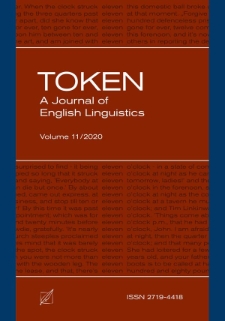Digital Library of the Jan Kochanowski University contains 13 466 digital objects
Object
Title: Argumentation in academic discourse: The case of Nobel Prizelectures in Economic Sciences
Creator:
Group publication title:
Abstract:
Nobel Prize lectures in Economic Sciences are examined in this contribution as anexample of highly specialized discourse, reflecting all the features of a genre relevantto a discourse community (Flowerdew 2015). A corpus has been built, including allthe 29 lectures delivered by the winners over a time span of fifteen years (2001-2015);the written version of the lectures has been considered in order to identify patterns ofargumentation (Hyland 2013, van Eemeren 2019). An integrated methodology has beenadopted, combining a corpus and a discourse perspective. The results of the analysishave shown examples of lexical indexicality and underlined some discourse markers, bethey causal, temporal, additive or hypothetical, frequently adopted to develop the topics.Discourse analysis has shown how argumentation is constructed across a variety of fieldsthrough the exposition of models, methods and theories, at a symptomatic, comparativeand causal level (van Eemeren – Grootendorst 1992). Particularly, comparative and causalfeatures of the language have been illustrated with reference to “expectation”, which isthe most prominent domain in this context. Moreover, some rhetorical strategies havebeen presented, such as the use of questions, narrative and figurative language, whichcharacterize the relationship between the Lecturer and the audience.
Place of publishing:
ISSN:
Publisher:
Wydawnictwo Uniwersytetu Jana Kochanowskiego w Kielcach
Date issued:
Identifier:
oai:bibliotekacyfrowa.ujk.edu.pl:4245 doi:10.25951/4305
Language:
Is part of:
Token : A Journal of English Linguistics
Has part:
Type:
Access rights:
Format:
Object collections:
- JKU Digital Library > University Publishing > Serial publications
- JKU Digital Library > University Publishing > Serial publications > "Token : A Journal of English Linguistics"
Last modified:
Apr 4, 2025
In our library since:
Nov 25, 2021
Number of object content hits:
186
Number of object content views in PDF format
250
All available object's versions:
https://bibliotekacyfrowa.ujk.edu.pl/publication/4305
Show description in RDF format:
Show description in OAI-PMH format:
| Edition name | Date |
|---|---|
| Salvi, Rita, Argumentation in academic discourse: The case of Nobel Prizelectures in Economic Sciences | Apr 4, 2025 |

